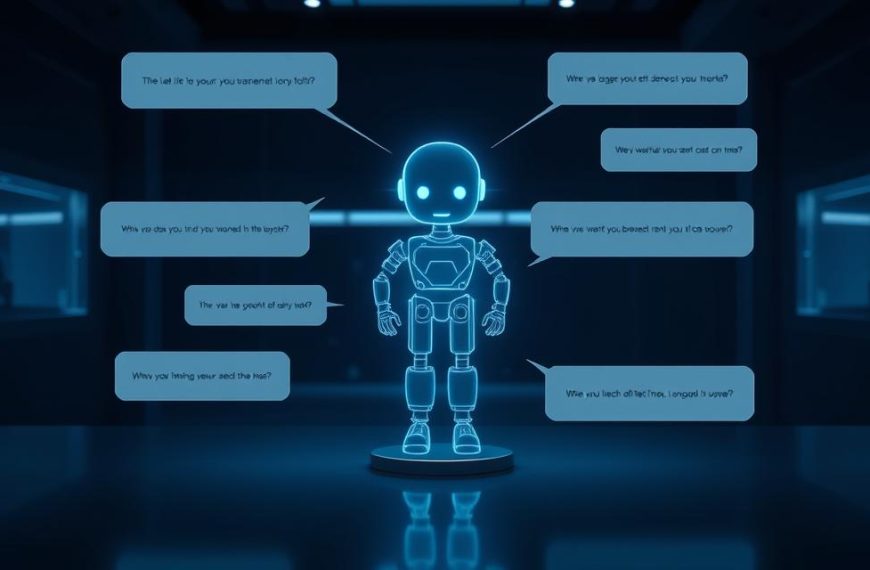In today’s digital world, AI tools promise to change how we find information. Many say they offer free access, but what does “truly free” really mean?
Platforms like Ask AI claim to be completely free, but this raises big questions. They might seem free, but there could be hidden catches.
This look into whether question ai free platforms are truly free without any catches is key. We’ll see what “completely free” really means for those looking for reliable info.
Knowing the difference helps us choose the right tools. We want tools that meet our needs without surprise costs or future fees.
The Evolution of AI Question Answering Systems
The journey of AI answering human queries is a big change in our digital world. It started with simple keyword matching. Now, we have systems that understand context, nuance, and even intent.
From Search Engines to Intelligent Response Systems
Early search engines just looked for keywords. They gave answers based on exact matches, without getting the question’s meaning. Then, natural language processing (NLP) came along. It let systems understand questions like we do.
Now, ai question answering uses machine learning. These systems get better with each use. They don’t just find info; they understand questions, look at the context, and give direct answers.
This change from finding documents to answering questions is big. Today, systems can handle complex questions in many areas. They help with everything from scientific research to everyday problems.
Market Demand for Instant, Accurate Answers
People want answers fast and right. This need for quick, accurate info has led to the growth of free ai search engine tech.
Several things drive this need:
- Life moves fast, and we need info quickly.
- We’re getting used to talking to assistants and chatbots.
- Information needs are getting more complex in work and life.
Because of this, new platforms have popped up. They focus on giving direct answers fast. They use big knowledge bases and process data in real-time.
Now, people expect AI to give more than just answers. They want explanations, sources, and context. This is the latest in ai question answering tech.
Defining “Free” in the AI Answer Engine Space
In the world of AI question-answering platforms, “free” can mean different things. It’s important to understand these differences. This helps you choose the right platform for your needs.
Monetisation Models Behind Supposedly Free Services
Many free AI assistants use clever ways to make money. One common method is through advertising. This means users get answers with ads or promotions.
Another way is by collecting data. These services study what users ask and how they interact. They might use this data to improve their services or sell it to others. Some services are open about this, while others are not.
The freemium model is also popular in AI. It offers basic features for free but charges for more advanced ones. This lets users try out the service before paying.
The Spectrum of Free Access: Limited versus Unlimited
Free AI services vary a lot. Some have strict limits, while others offer unlimited access. Limited services might have daily query limits or lower quality answers.
Platforms like Ask AI offer unlimited questions without any fees. But, it’s important to think about the long-term quality and privacy of such services.
Open-source options also provide unlimited access. But, they require technical skills to set up and manage. These solutions give users control but also the responsibility of costs and maintenance.
Choosing between limited and unlimited free access depends on your needs and what you value. Each option has its pros and cons that you should consider.
Question AI Free: Available Platforms and Their Offerings
There are many free AI question-answering platforms out there. They cater to different needs, from self-hosted open source AI to commercial services with free versions.
Knowing what each platform offers helps users pick the right tool for their needs.
Open-Source Alternatives for Self-Hosting
For those who want full control over their AI systems, open source is a great choice. These options let you customise and keep your data private, all without paying a subscription fee.
Hugging Face’s Transformers Library
Hugging Face has a vast collection of pre-trained models for natural language processing. Their Transformers library lets developers build advanced question-answering systems without any commercial restrictions.
The platform supports many model architectures and has detailed documentation. You can also tweak models for specific areas or needs.
LocalAI and Other Community Projects
LocalAI is part of a movement for locally-run AI solutions. It focuses on privacy and keeping data in your control. This project lets you run language models on your own hardware, without needing external help.
Community projects like LocalAI are always growing. They have active development and support forums. This shows the teamwork in the open source AI world.
Freemium Commercial Services
Commercial platforms with free tiers offer a way to try advanced AI for free. These services give you free access to some features, with extra options for those willing to pay.
Perplexity AI’s Free Tier
Perplexity AI has a strong free tier that gives detailed answers with sources. It has a clean interface and works well for everyday questions.
You don’t need to sign up to use it. The free version includes basic search and summarisation.
You.com’s Free Question Answering
You.com offers a free service that mixes web search with AI. It’s great for conversations and understanding the context of your questions.
Free users can ask follow-up questions and keep a conversation going. The service is always getting better, with more free features coming.
Ask AI is unique because it’s completely free, with no subscriptions or hidden fees. It supports many types of questions, including images and math formulas.
“Ask AI is entirely free with no subscriptions or hidden fees, allowing questions, image uploads, and formula analysis without charge.”
Some providers focus on making their services accessible, not just making money. For more on free AI answering services, check out this question AI review and alternative comparison.
| Platform Type | Primary Examples | Key Features | Best For |
|---|---|---|---|
| Open Source Self-Hosted | Hugging Face, LocalAI | Complete control, privacy focused | Developers, privacy-conscious users |
| Freemium Commercial | Perplexity AI, You.com | Easy access, current information | General users, researchers |
| Completely Free | Ask AI | No limitations, multiple input types | Students, budget-conscious users |
There’s a wide range of platforms to choose from. Each one has its own benefits, depending on what you need and how you like to work.
Technical Capabilities and Limitations of Free Options
When looking at free AI question answering systems, it’s key to understand their technical performance. These platforms differ a lot in what they can do. This affects how well they work and how reliable they are.
Processing Speed and Query Limitations
Free AI answer engines have limits to manage costs and keep systems stable. They often limit how many questions you can ask in a set time. This can be frustrating if you need to ask lots of questions.
How fast these systems respond also varies. Some, like Ask AI, aim for quick answers. Others might be slower, depending on how busy they are. This shows how much money and effort they’ve put into their systems.
Free users often get slower service when lots of people are using the system. This is because paid users get priority. Free access is a way to get people interested in paying for more.
Knowledge Base Depth and Update Frequency
How much information free AI systems can access is another big factor. Free services usually have less information than paid ones. This means they can’t answer as many questions.
How often these systems update their information also varies. Some update every few months. Others, like Ask AI, update more often to handle tricky questions. How often they update affects how good their answers are.
Free systems often focus on popular topics. This means users with special interests might find it hard to get answers. They might need to look elsewhere.
Accuracy Benchmarks Across Different Free Platforms
Tests show big differences in ai accuracy among free question answering systems. These differences come from things like the quality of their training data and how smart their algorithms are.
Systems that use advanced machine learning tend to do better. They understand questions better and give more relevant answers. Improvements in natural language processing also help make answers better.
Some free services are very accurate, even better than paid ones for simple questions. But, they struggle with harder or more specific questions.
| Platform Feature | Ask AI Free | OpenSource AI | BasicQuery |
|---|---|---|---|
| Queries Per Hour | 20 | Unlimited | 10 |
| Response Time (avg) | 1.2 seconds | 3.5 seconds | 2.8 seconds |
| Knowledge Updates | Weekly | User-controlled | Monthly |
| Accuracy Score (%) | 89 | 82 | 76 |
| Specialisation Support | Medium | High | Low |
The table shows how different free platforms balance various performance aspects. No service is perfect in every way. Each has its own strengths based on what users need.
When picking a free ai search engine, think about what you need. Do you want fast answers, lots of information, or special knowledge? The best choice depends on your priorities.
Practical Applications for Free Question AI Tools
Free question AI tools are making a big impact in education, personal productivity, and development. They offer advanced technology without the need for spending money. This makes them available to many different people.
These systems do more than just answer questions. They help students, researchers, and professionals in many ways.
Educational and Research Purposes
Free AI tools are changing how we learn. Students can solve tough math problems and explore complex topics easily.
Teachers use these tools to make lessons more engaging. They help explain hard ideas in different ways.
For research, these tools are very useful. They quickly give summaries and sources, speeding up research work.
Ask AI is a great example. It helps with both school and work research by answering technical questions.
Personal Knowledge Management
People use free AI tools to keep their knowledge organised. These systems sort out information in smart ways.
The main benefits are:
- Quick access to stored info
- Automatic organisation
- Linking related ideas
- Summarising long texts
This technology changes how we manage our knowledge. It connects different pieces of information together.
Development and Prototyping Uses
Developers find free AI tools great for testing apps. They offer a cheap way to try out AI features.
The tools help with:
- Testing natural language processing
- Creating user interactions
- Checking response accuracy
- Planning integration workflows
Startups and solo developers really benefit from these free tools. They can try out AI without spending a lot.
Using free tools for prototyping lowers risks and costs. It lets teams test ideas before spending on expensive paid solutions.
The uses of free AI question answering tools keep growing. They make innovation possible across many fields without any cost.
Privacy and Data Security Considerations
When we look at free AI tools, privacy is key. We need to know how our data is used and kept safe. This is very important for personal or sensitive information.
Data Collection Policies of Free Services
Free AI tools often use our data to make their services better. They might use our queries for ads or to improve their AI. This makes us worry about ai data privacy and keeping our info safe.
But, some services like Ask AI show us it can be done right. They promise not to keep our personal info, keep our chats private, and focus on our privacy. This is a good example for others to follow.
When we pick free AI tools, we should check:
- Privacy policies and terms of service
- How long they keep our data and how they delete it
- If they share our data with others
- How they protect our data when we send it to them
Self-Hosted Options for Enhanced Privacy
For those who really care about privacy, self-hosted AI is the best choice. These open source ai tools let you control your data and software fully.
With localAI and similar tools, you can:
- Keep all your data in your own space
- Change privacy and security settings as you like
- Avoid worries about others seeing your data
- Follow strict privacy rules if needed
Self-hosted AI needs tech skills and money to set up. But, it offers top ai data privacy protection. It’s great for places where keeping data safe is very important.
Choosing between free AI services and open source ai depends on what you need. Both have their own way of handling ai data privacy. It’s about finding what fits your needs and how much you’re willing to risk.
Making an Informed Choice: Free versus Paid Options
Choosing between free and paid AI answer engines needs careful thought. It’s about finding the right balance between what you need and what you can afford. You also want to make sure the solution is of good quality.
When Free Solutions Suffice
Free AI question answering tools are great for casual users. They’re perfect for personal use and occasional research.
Students and researchers often find free tools enough for their work. They cover basic knowledge queries and simple information needs.
Developers can use free tiers for testing new apps. Many freemium ai services offer enough for testing without spending money.
Free tools might be right for you if you:
- Use AI for personal questions
- Are a student or researcher
- Test apps on a small scale
- Do basic research
Scenarios Warranting Investment in Paid Services
Paid AI answer engines are needed in professional settings. They offer advanced features and reliability.
Businesses with many customer queries need paid services for steady performance. The extra support and uptime are worth the cost for businesses.
Organisations dealing with sensitive data should choose paid options for better security. Premium services have stronger data protection.
Paid services are a good choice if you:
- Need AI for business use
- Have critical apps that must work well
- Require specific domain knowledge
- Want advanced features like API integration
- Need top security and compliance
| Consideration Factor | Free Options | Paid Services |
|---|---|---|
| Query Volume Limits | Typically restricted | Higher or unlimited |
| Response Accuracy | Variable quality | Consistently high |
| Customer Support | Limited or community-based | Priority and dedicated |
| Feature Set | Basic functionality | Advanced capabilities |
| Data Security | Standard protection | Enhanced measures |
The free vs paid ai choice depends on your needs and expectations. Think about what you need now and what you might need later.
Many start with free versions and then move to paid plans as they grow. This way, they can try the technology before committing financially.
Remember, the most expensive option isn’t always the best. The best choice is one that fits your budget and meets your needs.
Conclusion
Free AI answer engines like Ask AI are great because they don’t cost anything. They give quick answers to your questions. This makes them useful for many different needs.
But, it’s important to know their limits. Free AI might not be as fast or have as much knowledge as paid options. Also, some might collect your data, so privacy is key.
For school, personal use, or testing, free tools are enough. But, if you need more, you might have to pay. Keeping up with new AI tools helps you find the best ones.
Free AI answers are handy and save money. Just think about what you really need. The AI world is always getting better, helping us learn more.



















